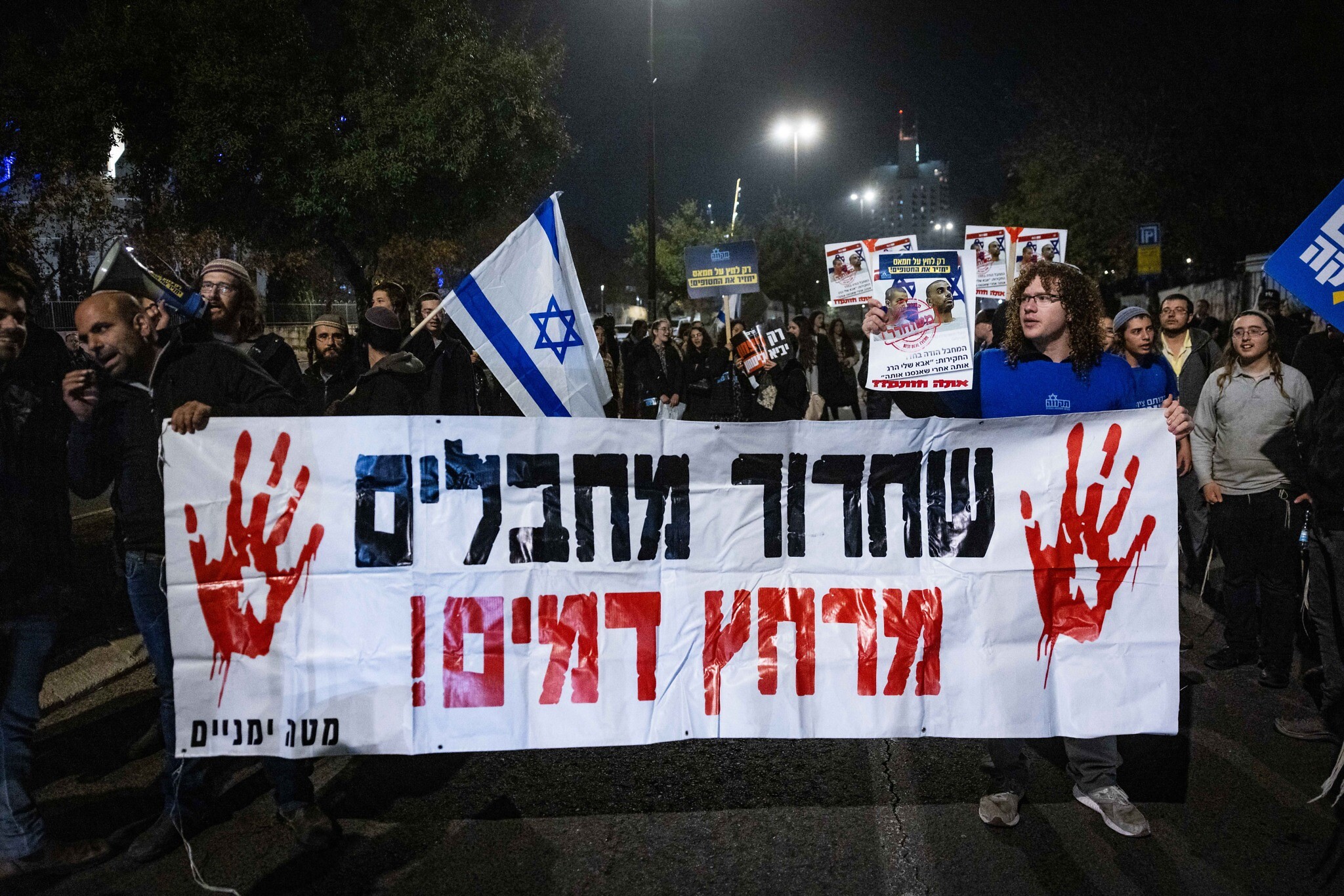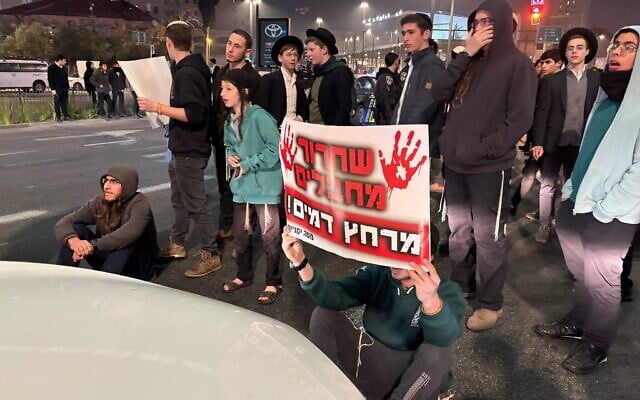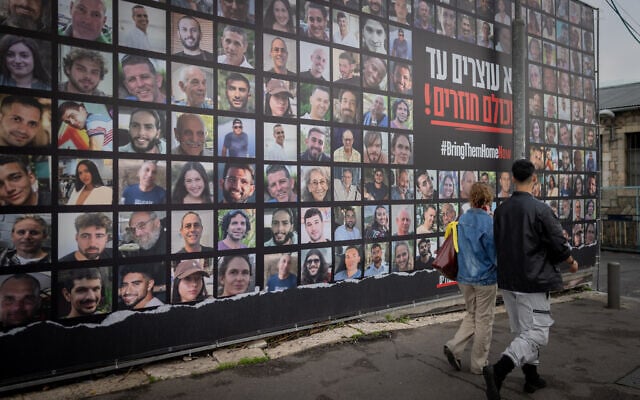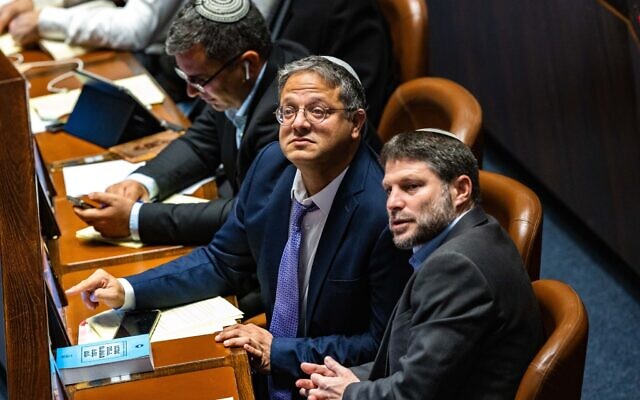



Right-wing protesters demonstrated Wednesday night against a deal for a truce in the Gaza war that would see the release of at least some of the Israeli hostages held by terror groups in the Palestinian enclave, warning that the terms of the agreement may leave most captives behind as well as endanger national security by releasing many convicted Palestinian terrorists.
The protests included demonstrators from a group of bereaved families from the 15-month war who marched on the Prime Minister’s Office in Jerusalem and spent the night camped in tents outside the building.
Other protesters blocked the main entrance to the capital.
A demonstration in support of the deal was held in Tel Aviv, which has been a focal point of rallies backing a ceasefire deal.
The deal, indirectly negotiated between Israel and Palestinian terror group Hamas, was announced by various officials on Wednesday. It is pending a formal signing by the two sides but is expected to go into effect by Sunday. Though the exact terms have not been published in full, once the deal’s implementation begins, Hamas will gradually release 33 Israeli hostages over the first 42 days of the ceasefire. It is not known how many are still alive, but Israel believes most are.
The rest of the hostages, numbering 65, will only be freed if the sides can agree on a second phase for the truce, negotiations for which will begin some two weeks into the halt in fighting. While Hamas claims the deal is a permanent end to the war and officials have said mediators have assured the terror group they will apply pressure for the truce to continue, Israel says nothing is guaranteed and fighting could resume.
War erupted on October 7, 2023, when Hamas led thousands of terrorists in an attack on Israel that killed 1,200 people, mostly civilians, and saw 251 hostages of all ages abducted to Gaza. The attack opened the war that has continued for over 15 months.
The Gvura Forum of families who lost loved ones fighting in Gaza said in a statement that the encampment at the PMO was aimed at “calling on cabinet ministers, who have a national responsibility, to stop this dangerous deal at the last moment.”
The Gvura forum chair, Yehoshua Shani, whose son was killed in the fighting, said in the statement: “This is a time of national emergency.”
“The deal being signed at this very minute will bring disaster upon us,” he warned. “It will leave 70 hostages behind and will endanger national security.”
As part of the deal, Israel will release around a thousand Palestinian security prisoners, including over 150 terrorists convicted of deadly attacks on Israelis.
The forum had also been planning to block the entrance to the PMO on Thursday at 11 a.m., when the cabinet had been originally scheduled to convene to approve the deal, though that meeting was delayed after Netanyahu’s office claimed Hamas was backtracking from some of the agreements.
The forum placed an exhibit of dozens of coffins covered in Israeli flags, saying they represent the Israelis who will end up dying because of the deal.
Another group, the hawkish Tikva Forum, which represents a group of hostage families and relatives of fallen soldiers, said in a statement that it was “concerned” about the deal.
The group likewise warned that the agreed-upon deal, which will see the hostages released in phases, will “effectively leave dozens of kidnapped people behind and pave the way for the next massacre and more hostages.”
“We are excited, like the entire Israeli people, when we see the hostages returning home after a long and cruel captivity,” the forum said, but nevertheless cautioned that “this deal is dangerous, both for the hostages who will remain in captivity and for the entire Israeli people.”
The forum appealed for cabinet members to “consider those who will be left behind, those who will not return, and those who will be killed in future terror attacks” before voting to approve the deal’s framework Thursday.
“We will not stop or remain silent until we ensure the return of all the hostages, the safety of Israeli citizens and the IDF soldiers, who may pay the most terrible price of all,” it added, urging government members to resign in protest of the deal.
In contrast, the Hostages and Missing Families Forum, the group representing the majority of families of hostages, welcomed the deal while adding that its fight wouldn’t end until all 98 hostages are returned to Israel from captivity in Gaza.
“This is an important and significant step that brings us closer to the moment when we will see all of the hostages return — the living for rehabilitation with their families and the fallen for a proper burial in their country,” the forum said. “However, the journey has only just begun and will not end until the last hostage is returned.”
The group demanded that the government remain committed to ensuring “the full implementation of the agreement until the last hostage is returned.”
“The announcement of the signing [of a deal] does not allow for joy or relief among the families. Our breath will be held until all our loved ones return home,” it said.
Meanwhile, dozens of right-wing demonstrators protesting the deal blocked traffic under Chords Bridge, at the entrance to Jerusalem.
Police tried to haul the protesters, mostly Orthodox young men, off the pavement and onto the sidewalk, but many of the demonstrators returned to the center of the road chanting: “Conquest, expulsion, settlement,” referring to the Gaza Strip and far-right hopes of establishing Israeli settlements in the enclave.
There were no reports of arrests and the road was eventually reopened.
There is opposition to the deal within the government too. Far-right cabinet members National Security Minister Itamar Ben Gvir and Finance Minister Bezalel Smotrich have both threatened to bolt the government over the deal.
While Ben Gvir has already publicly said he will take his Otzma Yehudit party out of the government — but not bring it down — Smotrich on Wednesday said he would take the same course with his Religious Zionism party unless the ceasefire enables an eventual return to battle with the aim of achieving the war’s stated goal of completely destroying Hamas’s military and governance capabilities.
Even with opposition from Ben Gvir and Smotrich, there would still be a majority of ministers in the cabinet to approve the deal.
The Religious Zionism party was holding a meeting on the matter on Thursday.
One member, MK Zvi Sukkot, told the Kan public broadcaster that the party would likely resign from the government in protest of the deal with Hamas, adding that the Religious Zionism party was “here to change the DNA of the State of Israel.”
The governing coalition would still retain a slim majority of 61 seats if the seven Religious Zionism MKs were to resign. But without Otzma Yehudit’s additional six lawmakers, it would be left with a minority in the 120-seat Knesset.
Ben Gvir has said that even if he pulls out of the government, he will not bring it down.
Ultranationalist deputy minister Avi Maoz, who represents the single-member Noam party, said in a statement Thursday that he would oppose the ceasefire deal, while saying he also opposes toppling the government over the matter since this would grant Hamas one of its alleged goals in the war.
Maoz contended that even before signing the deal, the government should fire the IDF chief of staff, the Southern Command chief, and the head of Military Intelligence, whom he holds responsible for failures that enabled the Hamas attack.
Ninety-four hostages have been in captivity since the October 7, 2023, Hamas onslaught in southern Israel, while two others — Avera Mengistu and Hisham al-Sayed have been held captive by the terror group since 2014 and 2015 respectively. Hamas has also held the bodies of slain IDF soldiers Hadar Goldin and Oron Shaul for over a decade after they were killed in the 2014 Operation Protective Edge.




